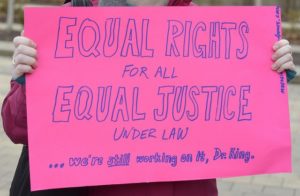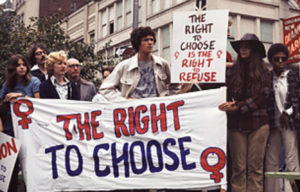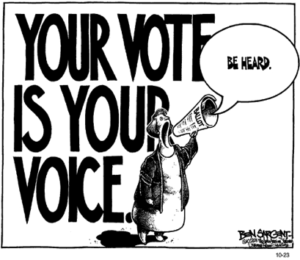Wade wins.
Suffragettes, June 14th, 1913. Women’s Right to Vote, The 19th Amendment, passed by Congress on June 4, 1919, and was ratified on August 18, 1920.
Roe v. Wade, 410 U.S. 113 (1973), is a landmark decisionissued in 1973 by the US Supreme Court on the issue of the constitutionality of laws that criminalized or restricted access to abortions. The Court ruled 7–2 that a right to privacyunder the Due Process Clause of th3 14th Amendment extended to a woman’s decision to have an abortion, but that this right must be balanced against the state’s interests in regulating abortions: protecting women’s health and protecting the potentiality of human life.
Justice Kennedy resigns.
Roe v. Wade may not go away all at once. The law could get pieced out and depleted to the point that abortion will not survive on legal precedence but slowly overturned with a conservative leaning Supreme Court, and states determining abortion legality.
This is not about right-to-life at this juncture in our social and political environment, but a woman’s rights issue.
If the Supreme Court and/or states deem abortion illegal, than by equal measure women of all economic and diverse backgrounds should immediately have free access to birth control. Also, women who have children whether single or not, should have policies in place to afford them healthcare and social services for themselves and their child, including paid family leave. Seemingly, women are being denied at both ends of the civil and human rights spectrum.
Further, there’s the equal pay for equal work issue. Women make approximately 90 cents on the dollar for every dollar a man earns, and if a woman has a child, the earnings decrease drastically, even more for women of color.
BIONEERS
Ever since women won the right to vote in 1920, women leaders and their allies have sought to pass an Equal Rights Amendment to drive total equality and justice for women into the U.S. Constitution. It did pass in 1972, but fell three states short of ratification. Today’s next wave of the women’s movement might finally make the ERA a reality. Why is Constitutional protection so crucial? Join leading advocates Joan Blades (MomsRising co-founder), attorney Kimberle Crenshaw and Jessica Neuwirth (ERA Coalition President) to learn the true story of what’s at stake and how life would be different and better for women and men.
As Americans, our focus now should be on equal rights for women, across the board, with an amendment that should have been passed decades ago. Now perhaps with so many women running for office, and winning, the change will finally come. Maybe it took this recent reality-TV election and dictorian-style governing to bend the arc of simple justice. As a young female politician shared after winning the local primary election in her New York district, “I believe in a modern, moral, and wealthy society no person in America should be too poor to live.’
The Guardian
Jessica Valentine:
If the Supreme Court overturns the decision, nearly half the states in the country will outlaw abortion-maybe more. Women will die from illegal abortions-as they did before-and most of those women will be the poorest, youngest, and most vulnerable among us.”
And, well, it serves the prison industry, too. “Women will be impirsoned for trying to end their pregnancies. Doctors and nurses will be, too. The tangible and troublng effects will be immediate.”
Suicide? In some countries the death by suicide is the highest among young pregnant women, ages 10-19.
And, this is why voting matters: 0.0006% of 137 million votes cast was the difference between a conservative-leaning Supreme Court and a liberal-leaning Supreme Court for decades to come.
[Axios]
A shift of fewer than 80,000 votes in three states (Michigan, Pennsylvania and Wisconsin) – or 0.06% of 137 million cast-would not just have made Hillary Clinton president. Perhaps even more important for the long run, a young liberal Supreme Court might have ruled on American for a generation. That’s Axios’ reporting. I add that the court would not necessarily have been liberal, but moderate. A court that would consider precedent and law first, politics second.
e.g. Merrick Garland
The same Senate leadership now promoting a quick and decisive Supreme Court appointment is the same leadership who through political maneuvering blocked President Obama’s nominee for almost an entire year, for reasons let’s just say, were ‘lame.’
My personal argument for delaying an appointment to the Supreme Court is not based on ideology (the Senate holds a GOP majority), but for criminality. If DT is indeed found guiltily of collusion or persuasion by a foreign government in our 2016 presidential election, then he should be impeached, or at the very least, never lead a political party, or the possibility of being re-elected.
[More from Axios]
The Washington Post’s Philip Bump did the math about Michigan, Pennsylvania and Wisconsin back during the transition: “DT won those states by 0.2, or 0.7 and 0.8 percentage points, respectively-and by 10,704, 46,765 and 22,177 votes. Those three wins gave him 46 electoral votes; if Clinton had done one point better in each state, she’d have won the electoral vote, too. But for 79,646 votes cast in those three states, she’d be the next president of the United States.
CNN chief legal analyst Jeffrey Tobin:
Abortion will be illegal in a significant part of the United States in 18 months…Roe v. Wade is doomed.’
And the Dailey News? A little more blunt:
“We ARe F*#%D.”
And Senate Majority Leader Mitch McConnell (R) smiles.
Sen. Susan Collins (R-Maine), to ABC’s Martha Raddatz on “This Week,” about her conversation with DT: “I told him that I was looking for a nominee that would demonstrate a respect for precedence. … I mentioned judicial temperament, integrity, intellect, experience, qualifications, fidelity to the rule of law and the constitution. But most important of all, a respect for precedence.”
In a former political context this statement would be formidable. In our current climate? It is weak and laughable. It means nothing. Any statement from his regarding his methods and madness toward Roe v. Wade should be dismissed and not believed.
Something to consider, getting back the voting issue. I ran into a former student recently. She was wearing a white t-shirt with a black, thick, equal sign emblazoned on the front. So, our conversation drifted toward politics and the social climate in our country. She shared that her young friends are political BUT DID NOT VOTE because they believe their vote doesn’t count. Can’t imagine how they thought that <sarcasm>.
Pew Research Center
For the fifth time in U.S. history, and the second time this century, a presidential candidate has won the White House while losing the popular vote.
In this week’s Electoral College balloting, DT won 304 electoral votes to Hillary Clinton’s 227, with five Democratic and two Republican “faithless electors” voting for other people. That result was despite the fact that Clinton received nearly 2.9 million more popular votes than Trump in November’s election, according to Pew Research Center’s tabulation of state election results. Our tally shows Clinton won 65.8 million votes (48.25%) to almost 63 million (46.15%) for Trump, with minor-party and independent candidates taking the rest.
This mismatch between the electoral and popular votes came about because DT won several large states (such as Florida, Pennsylvania and Wisconsin) by very narrow margins, gaining all their electoral votes in the process, even as Clinton claimed other large states (such as California, Illinois and New York) by much wider margins.
DT’s share of the popular vote, in fact, was the seventh-smallest winning percentage since 1828, when presidential campaigns began to resemble those of today.
Until we find a way to abolish the Electoral College, we must vote, and in large numbers to overcome voting restrictions and gerrymandering. McDonnell’s diabolic political maneuvering, although unethical, was apparently legal (Adam Liptak, NPR, 2018). It becomes increasingly apparent that the former administration and the democratic minority leadership should have played their own political game, instead of political naïveté malpractice. Stephen Dinan of the Washington Times wrote on January 1st, 2017 that,
President Obama will have one last chance to force Judge Merrick Garland onto the U.S. Supreme Court on Tuesday — but it’s a legal gamble and one that has so many pitfalls that even those who say he could get away with it believe it isn’t worth the fight.
Mr. Obama’s moment will come just before noon, in the five minutes that the Senate gavels the 114th Congress out of session and the time the 115th Congress begins.
In those few moments the Senate will go into what’s known as an “intersession recess,” creating one golden moment when the president could test his recess-appointment powers by sending Judge Garland to the high court.
A smattering of activists has asked him to give it a try, but Mr. Obama has given no indication that he’s thinking about it. The White House didn’t respond to a request for comment for this story.
William G. Ross, a law professor at Samford University in Birmingham, Alabama, said Mr. Obama would have the power to elevate Judge Garland. But he said it would be “politically unwise and damaging to the prestige of the court.”
As a brilliant Constitutional Law scholar and professor, why didn’t Obama, knowing what this country was facing, the increasing age of the court, the political maneuverings, take this chance?
NPR Fresh Air host Terry Gross spoke with NYTimes Supreme Court of the United States correspondent Adam Liptak about the increasingly polarized and right-leaning supreme court and how the next Supreme Court Justice will effect the balance of the court for at least the next generation.
“The Politics of the First Amendment have Completely Flipped.”
https://www.npr.org/programs/fresh-air/2018/07/05/626117568?showDate=2018-07-05
“She [Supreme Court Associate Justice Elena Kagan] said that the justices overruled the previous law because they wanted to. The First Amendment was meant for better things. It was meant not to undermine, but to protect democratic governments, including the role of public-sector unions. And she added – at every stop, black-robed rulers are overriding citizens’ choices. What struck me as especially interesting about that is that she’s really criticizing judges as a group. I don’t know whether she’s criticizing just the justices or judges in general for overruling things because they want to and for overriding citizens’ choices. Black-robed rulers, that’s a strong phrase when you’re talking about your fellow justices.
LIPTAK: Yes. And it’s coming from Justice Kagan, who is not a bomb-thrower, who is actually a very strategic thinker who doesn’t lightly make these accusations. So for her to get so worked up means that something very important is happening here. One way to shorthand what she’s saying is she’s accusing her conservative colleagues of what we used to call judicial activism, of using judicial power to strike down duly-enacted laws and saying that they’ve found now a tool which gives them that opportunity in many, many settings.
GROSS: The tool being the First Amendment?
LIPTAK: That’s right.
GROSS: So officially, judicial conservatives are supposed to be translating, you know, the Constitution to the letter of the law. And they’re supposed to be opposed to judicial activism.”
[…]
I mean, I really can’t overemphasize how different Justice Kennedy’s retirement is from just about anybody else’s. It’s the end of the world as we know it. It’s a transformative moment in American life. He has been so important, so central to the work of the court and to the meaning of the Constitution. And whoever succeeds him will cause the court to be a completely different place.
[Full interview approximately 42 minutes.]





Leave a Reply